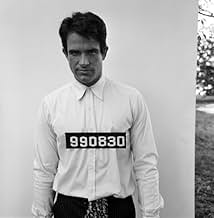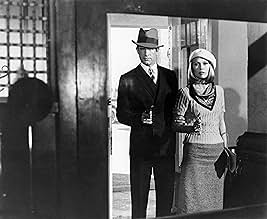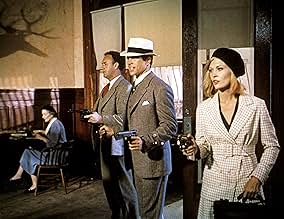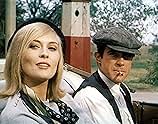Bored waitress Bonnie Parker falls in love with an ex-con named Clyde Barrow and together they start a violent crime spree through the country, stealing cars and robbing banks.Bored waitress Bonnie Parker falls in love with an ex-con named Clyde Barrow and together they start a violent crime spree through the country, stealing cars and robbing banks.Bored waitress Bonnie Parker falls in love with an ex-con named Clyde Barrow and together they start a violent crime spree through the country, stealing cars and robbing banks.
- Won 2 Oscars
- 22 wins & 29 nominations total
Martha Adcock
- Bank Customer
- (uncredited)
Harry Appling
- Bonnie's Uncle
- (uncredited)
Garrett Cassell
- Cop
- (uncredited)
Mabel Cavitt
- Bonnie's Mother
- (uncredited)
Patrick Cranshaw
- Bank Teller
- (uncredited)
Frances Fisher
- Bonnie's Aunt
- (uncredited)
Sadie French
- Bank Customer
- (uncredited)
Garry Goodgion
- Billy
- (uncredited)
- Director
- Writers
- All cast & crew
- Production, box office & more at IMDbPro
Storyline
Did you know
- TriviaWhen Warren Beatty was on-board as producer only, his sister Shirley MacLaine was a strong possibility to play Bonnie. But when Beatty decided to play Clyde himself, for obvious reasons he decided not to use MacLaine.
- GoofsThe film portrays Texas Ranger Frank Hamer as a vengeful bungler who had been captured, humiliated, and released by Bonnie and Clyde. In reality, Hamer was already a legendary Texas Ranger when he was coaxed out of semi-retirement to hunt down the duo. He never met either of them until he and his posse successfully ambushed and killed them near Gibsland, Louisiana, in 1934. In 1968, Hamer's widow and son sued the movie producers for defamation of character over his portrayal and were awarded an out-of-court settlement in 1971.
- Quotes
Clyde Barrow: This here's Miss Bonnie Parker. I'm Clyde Barrow. We rob banks.
- Alternate versionsSeveral scenes (most of which can be read in the film's script) were shot but removed or altered for various reasons, either for content or to keep the running time under two hours. These scenes are, in chronological order:
- The earliest versions had Clyde shooting and killing the butcher during their fight. This was toned down to Clyde just shooting the butcher, and finally just pistol whipping him. In real life, speculation still exists as to whether Clyde Barrow actually committed the crime this is based on; although his photo was picked out, the method in which it was executed doesn't fit his MO. In the final cut, there is a brief jump in the film during the fight, where it was spliced from the original, more graphic conclusion.
- After picking up C.W., Clyde and Bonnie take him to a diner where they plan their next robbery.
- After Clyde kills Doyle Johnson (the man on the running board), Bonnie talks with CW in the bathroom while Clyde cleans his guns and laments his actions. In the bathroom CW bathes and Bonnie attempts to seduce him, but changes her mind when CW proves to be less than romantic material. A still from this scene-- Bonnie wearing a slip and Clyde's hat-- can be seen on the DVD.
- A longer scene of Buck and Blanche's approach to the motor lodge. Buck is singing Bible hymns and Blanche scolds him for bringing her to see Clyde.
- A longer version of Bonnie's visit home; she sits in the car and her sister gives her a perm (a portion of this-- Bonnie on the running board getting her hair put up-- exists in the final film).
- A very long sequence in which Bonnie and Clyde get drunk and come to terms with their impending death. They trash their room and rip out the mattress from their bed, turning it into a makeshift coffin. They then put on their best clothes and put makeup on each other so they can see what they will look like when they're dead. The scene concludes with Bonnie and Clyde dancing around CW by candlelight and chanting "The Hearse Song."
- During the Platte City raid, C.W. uses a machine gun to attack the armored car instead of grenades.
- The final shootout, in its earliest form, was done entirely with still photos shown over sounds of machine gun fire and screams, and we never actually saw Bonnie or Clyde dead. The movie ended with the two farmers running towards the car while "Foggy Mountain Breakdown" Played in the background.
- ConnectionsFeatured in The 40th Annual Academy Awards (1968)
- SoundtracksDeep Night
Music by Charles Henderson
Lyrics by Rudy Vallee
Performed by Rudy Vallee
(heard over the opening credits)
Featured review
'Bonnie and Clyde' is not a film about two real people famous for so many bank robberies and murders across the big country... It shows a new kind of fury in which people could be harm by weapons... The film, however, manages to carry the impression that these two youngsters took great pleasure in robbing banks and stores... It also suggests that it was very easy for them to fool the lawas certainly occurred in real life... Though merited punishment caught up with them, audiences laughed at their remarkable deeds and wanted them to get away...
In 'Bonnie and Clyde,' Penn created an emotional state, an image of the 1930s filtered through his 1960s sensibility... The sense of this period reflects Penn's vision of how the 1930s Depression-era truly was, and for all the crazy style and banjo score, this vision is greatly private...
What is also personal about 'Bonnie and Clyde' and constitutes its incomparable quality, is its unusual mixture of humor and fear, its poetry of violation of the law as something that is gaiety and playfulness...
'Bonnie and Clyde' is both true and abstract... It is a gangster movie and a comedy-romance... It is an amusing film that turns bloody, a love affair that ends with tragedy...
A modification between pleasure and catastrophic events is important to the essential aim of the film... In their second bank robbery, a daring and joyful action goes morosely embittered when Clyde is forced to kill an executive in the bank, and real blood pours out from his body...
Bonnie and Clyde take self-gratification posing for photographs with their prisoners But when surrounded by detectives in a motel, they turn into vindictive bandits struggling for their lives... C. W. Moss, specially, brings to mind Baby Face Nelson, when he murders policemen with a blazing machine gun...
One of the stimulating moments in the film happens when Clyde chases Bonnie through a yellow corn field, while a cloud transverses the sun and slowly shadows the landscape... Here the characteristic quality of the Texas countryside and the vague aspect of the story are beautifully communicated......
Penn's masterpiece nominated for ten Academy Awards, including Best Picture, won two Oscars, one for Best Actress in a Supporting Role and another for Best Cinematography...
In 'Bonnie and Clyde,' Penn created an emotional state, an image of the 1930s filtered through his 1960s sensibility... The sense of this period reflects Penn's vision of how the 1930s Depression-era truly was, and for all the crazy style and banjo score, this vision is greatly private...
What is also personal about 'Bonnie and Clyde' and constitutes its incomparable quality, is its unusual mixture of humor and fear, its poetry of violation of the law as something that is gaiety and playfulness...
'Bonnie and Clyde' is both true and abstract... It is a gangster movie and a comedy-romance... It is an amusing film that turns bloody, a love affair that ends with tragedy...
A modification between pleasure and catastrophic events is important to the essential aim of the film... In their second bank robbery, a daring and joyful action goes morosely embittered when Clyde is forced to kill an executive in the bank, and real blood pours out from his body...
Bonnie and Clyde take self-gratification posing for photographs with their prisoners But when surrounded by detectives in a motel, they turn into vindictive bandits struggling for their lives... C. W. Moss, specially, brings to mind Baby Face Nelson, when he murders policemen with a blazing machine gun...
One of the stimulating moments in the film happens when Clyde chases Bonnie through a yellow corn field, while a cloud transverses the sun and slowly shadows the landscape... Here the characteristic quality of the Texas countryside and the vague aspect of the story are beautifully communicated......
Penn's masterpiece nominated for ten Academy Awards, including Best Picture, won two Oscars, one for Best Actress in a Supporting Role and another for Best Cinematography...
- Nazi_Fighter_David
- Feb 7, 2009
- Permalink
Details
- Release date
- Country of origin
- Official site
- Language
- Also known as
- Bonnie und Clyde
- Filming locations
- Red Oak, Texas, USA(Bank Robbery)
- Production companies
- See more company credits at IMDbPro
Box office
- Budget
- $2,500,000 (estimated)
- Gross worldwide
- $1,475
- Runtime1 hour 51 minutes
- Sound mix
- Aspect ratio
- 1.85 : 1
Contribute to this page
Suggest an edit or add missing content





















